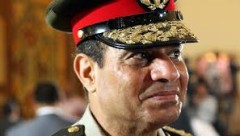
On Oct. 6, waves of Egyptians descended on Cairo’s Tahrir Square to celebrate the 40th anniversary of what is widely regarded as Egypt’s “victory” over Israel in the three-week Yom Kippur War. When Islamist supporters of the ousted and now imprisoned president, Mohamed Morsi, converged on the square, the symbolic heart of the 2011 revolution, the police opened fire, wounding more than 200 marchers.
Throughout the rest of Egypt, 53 Egyptians were killed in clashes with security forces, in the single bloodiest day of confrontations with the authorities in nearly two months.
What was supposed to have been a festive celebration of national unity degenerated into a day of yet more violence and mourning, exposing the deep and seemingly irreconcilable divisions that have plagued Egypt since the July 3 coup, which was staged by the Egyptian armed forces.
Since the collapse of Hosni Mubarak’s authoritarian regime more than two years ago, Egypt has rarely known a moment of tranquility or stability and has passed through three distinct revolutionary phases.
For 17 months after Mubarak was deposed, Egypt was ruled by a military council composed of the defence minister, Field Marshal Mohamed Hussein Tantawi, and a coterie of generals. They were not generally considered first-class stewards of the nation.
Morsi, Egypt’s first democratically-elected president and a representative of the heretofore banned Muslim Brotherhood, succeeded Tantawi in the wake of elections in June 2012. Morsi, an American-educated engineer, alienated many Egyptians by concentrating power in hands, trying to impose a shariah-based constitution on the country and mismanaging an already anemic economy.
On the first anniversary of Morsi’s induction as president, hundreds of thousands of Egyptians took to the streets in a groundswell of dissatisfaction with his rule, prompting Gen. Abdel-Fattah el-Sissi, the defence minister, to intervene. Morsi and his followers were removed from office and detained.
Sissi, now Egypt’s de facto leader, installed a figurehead president, Adli Mansour, a judge whom Mubarak had appointed. Sissi also reimposed the state of emergency that had prevailed for three decades under Mubarak’s administration.
In addition, Sissi cracked down hard on the Muslim Brotherhood, arresting its leaders, closing its newspapers and television stations and allowing anti-Muslim Brotherhood demonstrators to burn down its gleaming new headquarters in the centre of Cairo.
More to the point, in three mass shootings from July to August, upwards of 1,000 pro-Morsi protesters demanding Morsi`s reinstatement were killed by soldiers and police.

By way of response, the new military-backed government laid charges of incitement to murder against Morsi, accusing him of precipitating clashes outside the presidential palace last December. Morsi is still behind bars, held in an undisclosed location, but was permitted to speak to his family by phone last month.
Apart from imprisoning Morsi and his associates, Sissi, who was Mubarak`s chief of military intelligence, has taken a series of counter-revolutionary steps to resurrect the status quo ante.
Almost two months ago, he appointed 25 provincial governors while dismissing 11 Morsi appointees. Nineteen of the new governors are generals, which is hardly a coincidence. Until Morsi`s accession, all of Egypt`s presidents, including Mubarak, had been ex-generals.
In August, an Egyptian court ordered Mubarak`s release from prison and transfer to a military hospital, ending more than two years of incarceration. More significantly, most of the charges brought against him have been dismissed. Mubarak still faces charges of having orchestrated the killing of hundreds of civilians during the Arab Spring protests that culminated in his removal. Pundits believe he will eventually be acquitted.
On Sept, 23, in yet another development that suggests that Egypt is returning to Mubarak-style authoritarianism, an Egyptian court issued a preliminary injunction dissolving the Muslim Brotherhood and confiscating its assets. The left-wing Tagammu party sought the injunction, claiming the Muslim Brotherhood had engaged in terrorism and exploited Islam for political ends.
These moves have been applauded by most Egyptians, who hold the view that Morsi and company abused their power and bungled their mandate. According to an Associated Press correspondent in Cairo, Sissi is riding “a wave of adulation, drawing comparisons between him and modern Egypt`s first charismatic strongman, former president Gamal Abdel Nasser.”

Nasser, too, repressed the Muslim Brotherhood when it suited his purposes.
Although the Muslim Brotherhood has disavowed violence as a political tactic, some of its members and supporters, having lost faith in the democratic process since July 3, appear to have rejected passive resistance to the new order in Egypt.
On Sept. 6, in Cairo, the Egyptian minister of interior escaped an assassination attempt when a powerful bomb blasted his motorcade. The attack sparked fears that Egypt may yet face the kind of Islamic rebellion that convulsed the country in the late 1990s.
Such a revolt has erupted already in the Sinai Peninsula, which was once a tourist mecca.
Since July, Islamic militants have launched a succession of attacks, killing scores of Egyptians. In the latest incidents, on Oct. 7, six soldiers were killed in an ambush in Ismailiya, and three people died when a massive car bomb damaged a building in El Arish housing the headquarters of the state security service.
In response, Egypt has carried out ground and air operations to deal with the problem. Israel, which signed a peace treaty with Egypt in 1979, is certainly pleased with these developments. So much so that Israel has permitted the Egyptian army to operate in areas of the Sinai that are technically off-limits to it under the terms of the treaty.
As part of this effort, Egypt has destroyed more than 150 smuggling tunnels linking the Sinai to the Gaza Strip, which has been fully controlled by Hamas since the summer of 2007.
Two and a half months ago, the commander of Egypt’s Third Army, Gen. Osama Askar, accused Hamas of having smuggled 19 rockets into Egypt with the intent of “terrorizing” Egyptian citizens. Two weeks ago, the Egyptian government went further, claiming that militants from Gaza have staged joint attacks with hardline Islamists in northern Sinai.
Egyptian Foreign Minister Nabil Fahmy has warned Hamas that Egypt’s reaction will be “severe” if Hamas violates its national security. Hamas has heatedly denied these accusations, saying they run counter to Egypt’s “history and role in protecting the Palestinian nation.”
The current chill in relations between Egypt and Hamas runs contrary to the warm atmosphere that prevailed during the Morsi era. But with Morsi’s departure from the scene, that spirit of cooperation has vanished.